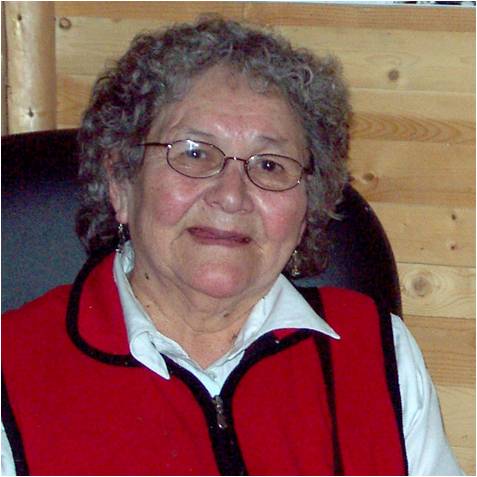Elders and Educators
Pauline Bernard, Elder
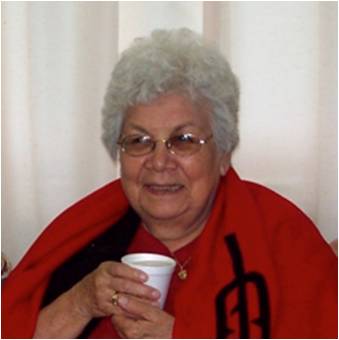 Pauline Bernard is a treasured and deeply loved Elder who lives in the Mi’kmaw community of Membertou in Unama’ki (Cape Breton), NS. She has devoted much of her life to educational programming, serving as a teacher’s aid for many years and then, in 1981, establishing the first kindergarten in Membertou. Pauline, a graduate of Early Childhood Education, was the kindergarten’s Director for 15 years. The pre-school initially occupied the basement of an old school house and began as a half day program but within a few months was in full operation and had expanded to include a new daycare centre. The school has been used as a model in both the native and non-native communities in Atlantic Canada. With respect to her educational work, Pauline says, “I love working with the children – the work is so special.” She retired in 1995 and then quickly discovered that her life became even busier as she now attends numerous meetings and works on several different committees in the roles of advisor and Elder. In these regards, Pauline has worked on both provincial and national education committees and is also exceptionally active in her home community. Pauline is currently a member of the Heritage Committee for the Membertou Heritage Park and the Membertou Governance Committee. In addition, Pauline and her sister, Katy McEwan, founded the Weka’test Singers (meaning “Northern Lights”), an all female group of Mi’kmaw singers and drummers. She is also a Pipe Carrier and follows Native Spirituality and Christianity. Her sacred work has led to considerable traveling to participate in special events, as for example, drumming in a longhouse in Vancouver and the ceremonies within the Aboriginal Spiritual Journey to Europe. The Aboriginal Spiritual Journey was part of Canada’s Year of the Veteran in 2005; Pauline, Katy, Aboriginal veterans, and others went to several battlefields and cemeteries, including Normandy, Ypres, and Dieppe, to work with ceremony to call home the Spirits of fallen warriors. Pauline was also was a member of the Elders’ Advisory Committee for the Atlantic Policy Congress’s "Planting the Seed" series in 2007-2008 to share and teach about First Nations’ culture, within the overall understanding that “Sharing is the First Nation Way” (more information on the “Planting the Seed” project is provided in our bio for Pauline’s sister, Katy McEwan, who also helped). Over the past decade, Pauline has participated in numerous Integrative Science workshops and other events, always providing us with loving, knowledgeable guidance and wisdom. She has four children, all of whom live in Membertou; she also has 12 grandchildren. In 2007, Pauline’s dedicated work and many achievements were recognized in the form of the Grand Chief Donald Marshall Senior Elder Award from the Province of Nova Scotia.
Pauline Bernard is a treasured and deeply loved Elder who lives in the Mi’kmaw community of Membertou in Unama’ki (Cape Breton), NS. She has devoted much of her life to educational programming, serving as a teacher’s aid for many years and then, in 1981, establishing the first kindergarten in Membertou. Pauline, a graduate of Early Childhood Education, was the kindergarten’s Director for 15 years. The pre-school initially occupied the basement of an old school house and began as a half day program but within a few months was in full operation and had expanded to include a new daycare centre. The school has been used as a model in both the native and non-native communities in Atlantic Canada. With respect to her educational work, Pauline says, “I love working with the children – the work is so special.” She retired in 1995 and then quickly discovered that her life became even busier as she now attends numerous meetings and works on several different committees in the roles of advisor and Elder. In these regards, Pauline has worked on both provincial and national education committees and is also exceptionally active in her home community. Pauline is currently a member of the Heritage Committee for the Membertou Heritage Park and the Membertou Governance Committee. In addition, Pauline and her sister, Katy McEwan, founded the Weka’test Singers (meaning “Northern Lights”), an all female group of Mi’kmaw singers and drummers. She is also a Pipe Carrier and follows Native Spirituality and Christianity. Her sacred work has led to considerable traveling to participate in special events, as for example, drumming in a longhouse in Vancouver and the ceremonies within the Aboriginal Spiritual Journey to Europe. The Aboriginal Spiritual Journey was part of Canada’s Year of the Veteran in 2005; Pauline, Katy, Aboriginal veterans, and others went to several battlefields and cemeteries, including Normandy, Ypres, and Dieppe, to work with ceremony to call home the Spirits of fallen warriors. Pauline was also was a member of the Elders’ Advisory Committee for the Atlantic Policy Congress’s "Planting the Seed" series in 2007-2008 to share and teach about First Nations’ culture, within the overall understanding that “Sharing is the First Nation Way” (more information on the “Planting the Seed” project is provided in our bio for Pauline’s sister, Katy McEwan, who also helped). Over the past decade, Pauline has participated in numerous Integrative Science workshops and other events, always providing us with loving, knowledgeable guidance and wisdom. She has four children, all of whom live in Membertou; she also has 12 grandchildren. In 2007, Pauline’s dedicated work and many achievements were recognized in the form of the Grand Chief Donald Marshall Senior Elder Award from the Province of Nova Scotia.
Diana Denny, Elder
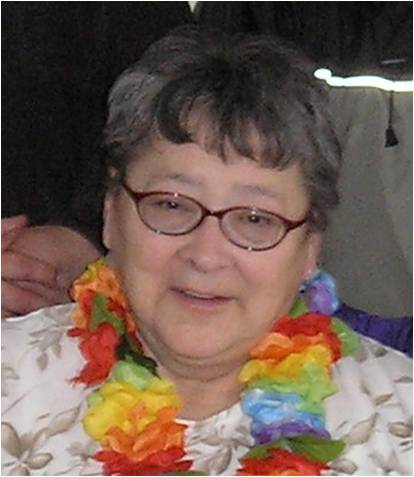 Diana Denny is a treasured and much loved Elder who lives in the Mi'kmaw community of Eskasoni in Unama'ki (Cape Breton), Nova Scotia. She is a fluent speaker and writer of Mi'kmaq and worked for many years with Eskasoni Fish and Wildlife. Now retired, she is a regular participant in numerous workshops and projects that welcome Mi'kmaw Traditional Knowledge such as those of Integrative Science, the Unama'ki Institute of Natural Resources (UINR), the Collaborative Environmental Planning Initiative (CEPI) for the Bras d'Or Lakes ecosystem in Unama'ki, Parks Canada, and other organizations. Diana has a wonderful sense of humour, as is evident when she says "she graduated at age 43 ... had to educate herself late in life because she knew everything while she was in school!!!" She is a strong proponent of Two-Eyed Seeing and encourages all creative and meaningful ways that its message can be shared and implemented. For example, Diana is currently working with other Mi'kmaw Elders and Prune Harris in a Two-Eyed Seeing research project on storytelling within traditional and modern child-raising practices.
Diana Denny is a treasured and much loved Elder who lives in the Mi'kmaw community of Eskasoni in Unama'ki (Cape Breton), Nova Scotia. She is a fluent speaker and writer of Mi'kmaq and worked for many years with Eskasoni Fish and Wildlife. Now retired, she is a regular participant in numerous workshops and projects that welcome Mi'kmaw Traditional Knowledge such as those of Integrative Science, the Unama'ki Institute of Natural Resources (UINR), the Collaborative Environmental Planning Initiative (CEPI) for the Bras d'Or Lakes ecosystem in Unama'ki, Parks Canada, and other organizations. Diana has a wonderful sense of humour, as is evident when she says "she graduated at age 43 ... had to educate herself late in life because she knew everything while she was in school!!!" She is a strong proponent of Two-Eyed Seeing and encourages all creative and meaningful ways that its message can be shared and implemented. For example, Diana is currently working with other Mi'kmaw Elders and Prune Harris in a Two-Eyed Seeing research project on storytelling within traditional and modern child-raising practices.
James (Jim) Hesser, PhD
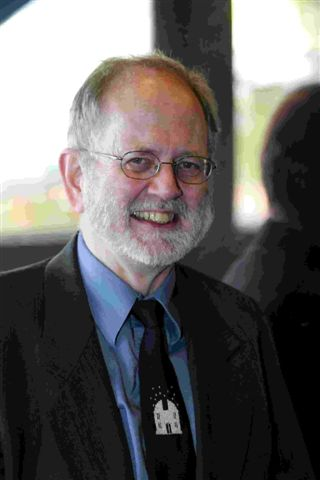
Albert Marshall, Elder & Honorary Doctor of Letters
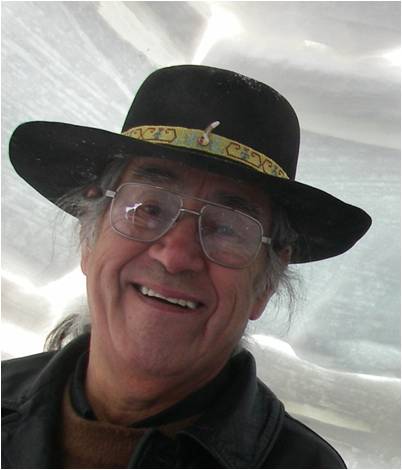 Albert Marshall is a highly respected and much loved Elder of the Mi’kmaw Nation; he lives in Eskasoni First Nation in Unama'ki (Cape Breton), Nova Scotia, and is a passionate advocate of cross-cultural understandings and healing and of our human responsibilities to care for all creatures and our Earth Mother. He is the “designated voice” with respect to environmental issues for the Mi’kmaw Elders of Unama’ki and he sits on various committees that develop and guide collaborative initiatives and understandings in natural resource management or that serve First Nations’ governance issues, or that otherwise work towards ethical environmental, social and economic practices. Albert is a much sought after speaker locally, nationally, and internationally given his passion for and understanding of the Mi’kmaq culture and its ‘living knowledge’. In October 2009, he and his wife Murdena were awarded Honorary Doctorates of Letters by Cape Breton University for their work which seeks the preservation, understanding, and promotion of cultural beliefs and practices among all Mi’kmaw communities, and encourages a strong future for the Mi’kmaw Nation and its peoples. In February 2009, Albert was awarded the Marshall Award for Aboriginal Leadership as part of the Eco-Hero Awards delivered by the Nova Scotia Environmental Network. Albert and Murdena together have developed KECCA (Knowledge Education & Culture Consultant Associates)
Albert Marshall is a highly respected and much loved Elder of the Mi’kmaw Nation; he lives in Eskasoni First Nation in Unama'ki (Cape Breton), Nova Scotia, and is a passionate advocate of cross-cultural understandings and healing and of our human responsibilities to care for all creatures and our Earth Mother. He is the “designated voice” with respect to environmental issues for the Mi’kmaw Elders of Unama’ki and he sits on various committees that develop and guide collaborative initiatives and understandings in natural resource management or that serve First Nations’ governance issues, or that otherwise work towards ethical environmental, social and economic practices. Albert is a much sought after speaker locally, nationally, and internationally given his passion for and understanding of the Mi’kmaq culture and its ‘living knowledge’. In October 2009, he and his wife Murdena were awarded Honorary Doctorates of Letters by Cape Breton University for their work which seeks the preservation, understanding, and promotion of cultural beliefs and practices among all Mi’kmaw communities, and encourages a strong future for the Mi’kmaw Nation and its peoples. In February 2009, Albert was awarded the Marshall Award for Aboriginal Leadership as part of the Eco-Hero Awards delivered by the Nova Scotia Environmental Network. Albert and Murdena together have developed KECCA (Knowledge Education & Culture Consultant Associates)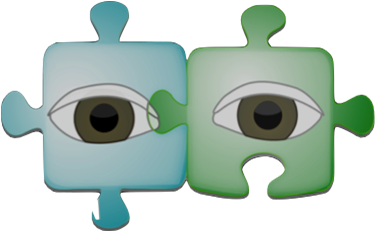 to better enable their work and they have been instrumental in the development and stewardship of Cape Breton University's Integrative Science academic program and multi-faceted research program. It is Albert who brought forward Etuaptmumk / Two-Eyed Seeing as a Guiding Principle for Integrative Science and encourages its awareness across Canada and beyond. Two-Eyed Seeing has, for example, recently been highlighted within forestry research in British Columbia, collaborative work related to the federal ‘species at risk act’ (SARA) in Ontario and British Columbia, cultural-educational camps for youth in Nunavut, dialogue on concerns about underwater munitions at a meeting in Hawaii, efforts for social justice at a conference in Membertou First Nation, discussions for cultural competency and cultural humility within mental health practices in Cape Breton, cross-cultural discussions on Mi’kmaq Ecological Knowledge for the environmental and economic sectors in Nova Scotia, research innovations to link the arts and healthy communities at the Ontario College of Art and Design in Toronto, and discussions on economic development from Aboriginal perspectives at meetings organized by the Atlantic Aboriginal Economic Development Integrated Research Program. Two-Eyed Seeing is also an important principle for the Unama'ki Institute of Natural Resources (UINR) with which Albert is associated, as well as the Collaborative Environmental Planning Initiative (CEPI) for the Bras d'Or Lake and its watershed in Cape Breton, a process in which Albert has been involved since its inception. In addition to Two-Eyed Seeing, Albert is a passionate advocate of Netukulimk, which involves inter-relativenss, co-existence, interconnectiveness, and community spirit. Albert was an inmate of the Indian Residential School in Shubenacadie, Nova Scotia, for much of his childhood and teenage years. He was profoundly affected by this experience and it has led him on a lifelong quest to connect with and understand both the culture he was removed from, and the culture he was forced into ... and to help these cultures find ways to live in mutual respect of each other’s strengths and ways.
to better enable their work and they have been instrumental in the development and stewardship of Cape Breton University's Integrative Science academic program and multi-faceted research program. It is Albert who brought forward Etuaptmumk / Two-Eyed Seeing as a Guiding Principle for Integrative Science and encourages its awareness across Canada and beyond. Two-Eyed Seeing has, for example, recently been highlighted within forestry research in British Columbia, collaborative work related to the federal ‘species at risk act’ (SARA) in Ontario and British Columbia, cultural-educational camps for youth in Nunavut, dialogue on concerns about underwater munitions at a meeting in Hawaii, efforts for social justice at a conference in Membertou First Nation, discussions for cultural competency and cultural humility within mental health practices in Cape Breton, cross-cultural discussions on Mi’kmaq Ecological Knowledge for the environmental and economic sectors in Nova Scotia, research innovations to link the arts and healthy communities at the Ontario College of Art and Design in Toronto, and discussions on economic development from Aboriginal perspectives at meetings organized by the Atlantic Aboriginal Economic Development Integrated Research Program. Two-Eyed Seeing is also an important principle for the Unama'ki Institute of Natural Resources (UINR) with which Albert is associated, as well as the Collaborative Environmental Planning Initiative (CEPI) for the Bras d'Or Lake and its watershed in Cape Breton, a process in which Albert has been involved since its inception. In addition to Two-Eyed Seeing, Albert is a passionate advocate of Netukulimk, which involves inter-relativenss, co-existence, interconnectiveness, and community spirit. Albert was an inmate of the Indian Residential School in Shubenacadie, Nova Scotia, for much of his childhood and teenage years. He was profoundly affected by this experience and it has led him on a lifelong quest to connect with and understand both the culture he was removed from, and the culture he was forced into ... and to help these cultures find ways to live in mutual respect of each other’s strengths and ways.
You can view a list of Elder Albert's presentations, publications, and participations.
You can download a 1000 word biography for Albert Marshall (updated December 2012).
Lillian Marshall, Elder & BACS
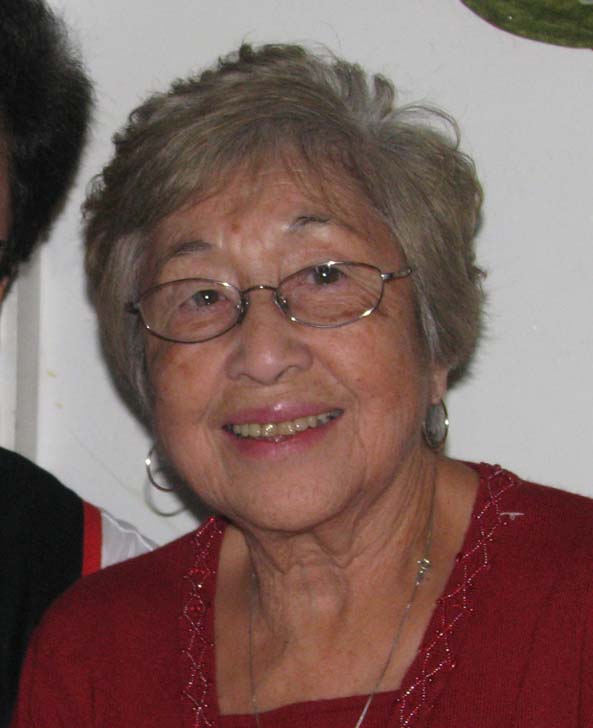
You can view a video of Elder Lillian at the Membertou Awards Night in 2007, as archived on the Membertou Heritage Park website. The video shows Lillian explaining the game of Waltes to others who are playing the game.
Murdena Marshall, Elder, MEd & Honorary Doctor of Letters
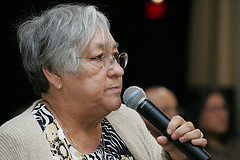
Murdena Marshall, MEd, is a much loved and deeply valued Elder from from the Mi’kmaw Nation; she lives in Eskasoni First Nation in Unama’ki (Cape Breton), Nova Scotia. Murdena is retired from her position as Associate Professor of Mi’kmaw Studies at Cape Breton University but continues to be highly active in projects locally, regionally, and nationally. She has devoted her life to encouraging young people to explore their culture and the nature around them. The Integrative Science program at Cape Breton University represents the vision that Murdena, her husband Albert, Cheryl Bartlett, and others have with respect to including and acknowledging Aboriginal understandings alongside Western science. Murdena, who is a fluent speaker, reader, and writer of the Mi’kmaw language, is a highly respected holder of considerable understandings with respect to Mi’kmaw Traditional Knowledge, and is a treasured living resource by many individuals and communities, as well as a great diversity of organizations. Murdena is a member of the Elders' Advisory Council for the Mi'kmawey Debert Cultural Centre and she is a key organizer and participant in Elders' Gatherings of the Unama'ki Institute of Natural Resources (UINR). She has co-authored the chapbook “I Got It From An Elder; conversations in healing language” with Marilyn Iwama and others, as well as the book “Mi’kmaq Hieroglyphic Prayers: readings in North America’s first indigenous script” with David Schmidt, and various journal articles with Cheryl Bartlett, Prune Harris, and Annamarie Hatcher. Through storytelling, Murdena shares the wisdom, love, and understandings that the Mi’kmaw people have for the land and water, plants and animals, and people that make up the world around us. Murdena and her husband Albert formed KECCA, for “knowledge, education, and culture consulting associates” and, individually or together, they have spoken at numerous local, regional, national and international conferences and are intimately involved in the Integrative Science research program. Together, they were awarded Honorary Doctors of Letters by Cape Breton University in October 2009.
You can listen to a CBC Radio interview on leadership conducted with Elder Murdena in 2009.
You can listen to a CBC Radio interview on the Mi'kmaq Night Sky Story "Muin and the Seven Bird Hunters" conducted with Elder Murdena and Cheryl Bartlett in 2011.
You can read the tribute to Elder Murdena by the Honourable Senator Jane Cordy, as delivered in the Senate of Canada in October 2011.
You can download a 1000 word biography for Murdena Marshall (updated: Dec 2012).
Susie Marshall, Elder
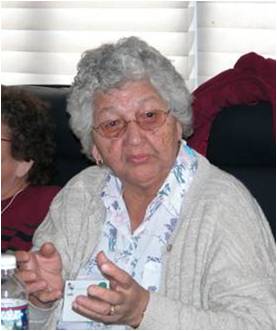 Susie Marshall is a quiet, loving Mi'kmaw Elder who lives in Eskasoni First Nation in Unama'ki (Cape Breton), Nova Scotia. She is an excellent crafts person who makes superb baskets that sell far and wide. She greatly loves and enjoys the out-of-doors and has excellent skills as a hunter and trapper. Her numerous granchildren often accompany her on trips in the woods and Susie finds this environment to be the best one in which to transmit her understandings of Mi'kmaw Traditional Knowledge. She is a fluent speaker of Mi'kmaq and has participated in numerous Integrative Science workshops and events over the past decade. Susie is currently working with other Mi'kmaw Elders and Prune Harris in a Two-Eyed Seeing research project to bring new life to old stories for today's children.
Susie Marshall is a quiet, loving Mi'kmaw Elder who lives in Eskasoni First Nation in Unama'ki (Cape Breton), Nova Scotia. She is an excellent crafts person who makes superb baskets that sell far and wide. She greatly loves and enjoys the out-of-doors and has excellent skills as a hunter and trapper. Her numerous granchildren often accompany her on trips in the woods and Susie finds this environment to be the best one in which to transmit her understandings of Mi'kmaw Traditional Knowledge. She is a fluent speaker of Mi'kmaq and has participated in numerous Integrative Science workshops and events over the past decade. Susie is currently working with other Mi'kmaw Elders and Prune Harris in a Two-Eyed Seeing research project to bring new life to old stories for today's children.
Katy McEwen, Elder, BACS & MSW
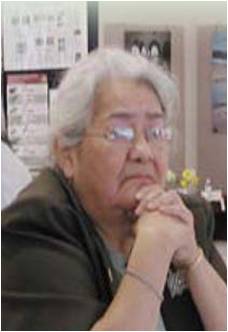 Katy McEwen is a much loved and treasured Elder who lives in the Mi’kmaw community of Membertou, adjacent to the city of Sydney, in Unama’ki (Cape Breton), NS. She was born and raised in this community and she worked for 13 years at the Sydney daycare centre. In 1987, Katy went back to school, graduating from Cape Breton University with a Bachelor of Arts Community Studies (BACS) degree and then proceeding to Carleton University to complete her Masters in Social Work. Her thesis on the forcible resettling of the Mi’kmaw people from their homes along the waterfront on Kings Road in Sydney to the present day site of the Membertou reserve was written entirely in Mi’kmaq. For many years after she attained her Masters, Katy worked in Mi’kmaw Family and Children’s Services. Upon retiring, she has found that, like her sister Pauline Bernard, she is extremely busy in her community roles as an advisor and an Elder. Much of her time is spent attending meetings and gatherings; she is, for example, a member of the Heritage Committee for the Membertou Heritage Park and also the Membertou Governance Committee. As a Pipe Carrier who follows Native Spirituality and Christianity, Katy is one of the founders of the Weka’test Singers (meaning “Northern Lights”), an all female group of Mi’kmaw singers and drummers. She also teaches prayers in Mi’kmaq. Katy is a residential school survivor and she devotes considerable time to helping other survivors through working with traditional ceremonies. Her sacred work has led to considerable traveling to participate in special events, including drumming in a longhouse in Vancouver and the Aboriginal Spiritual Journey to Europe (more information about the Aboriginal Spiritual Journey is provided in our bio for Katy’s sister, Pauline Bernard, who also participated). Another project that both Katy and Pauline have helped, as members on its Elders’ Advisory Committee, was the Atlantic Policy Congress’s "Planting the Seed" series which shares and teaches about First Nations’ culture, within the overall understanding that “Sharing is the First Nation Way”. Three documents were produced: ( 1) an orientation guide (www.apcfnc.ca/en/health/resources/OrientationGuideAtlanticFirstNations.pdf); (2) a cultural education pamphlet (www.apcfnc.ca/en/health/resources/First20Nation20Spirituality.pdf); and (3) a human resource inventory for communities (www.apcfnc.ca/en/health/resources/HR20Guide20doc.pdf). Over the years, Katyhas helped Integrative Science in numerous, invaluable ways; she has participated in our workshops, conferences, and sweats, and she has provided loving guidance, knowledge, and humour. She is mother to three daughters and she has seven grandchildren, all of whom live in Membertou First Nation.
Katy McEwen is a much loved and treasured Elder who lives in the Mi’kmaw community of Membertou, adjacent to the city of Sydney, in Unama’ki (Cape Breton), NS. She was born and raised in this community and she worked for 13 years at the Sydney daycare centre. In 1987, Katy went back to school, graduating from Cape Breton University with a Bachelor of Arts Community Studies (BACS) degree and then proceeding to Carleton University to complete her Masters in Social Work. Her thesis on the forcible resettling of the Mi’kmaw people from their homes along the waterfront on Kings Road in Sydney to the present day site of the Membertou reserve was written entirely in Mi’kmaq. For many years after she attained her Masters, Katy worked in Mi’kmaw Family and Children’s Services. Upon retiring, she has found that, like her sister Pauline Bernard, she is extremely busy in her community roles as an advisor and an Elder. Much of her time is spent attending meetings and gatherings; she is, for example, a member of the Heritage Committee for the Membertou Heritage Park and also the Membertou Governance Committee. As a Pipe Carrier who follows Native Spirituality and Christianity, Katy is one of the founders of the Weka’test Singers (meaning “Northern Lights”), an all female group of Mi’kmaw singers and drummers. She also teaches prayers in Mi’kmaq. Katy is a residential school survivor and she devotes considerable time to helping other survivors through working with traditional ceremonies. Her sacred work has led to considerable traveling to participate in special events, including drumming in a longhouse in Vancouver and the Aboriginal Spiritual Journey to Europe (more information about the Aboriginal Spiritual Journey is provided in our bio for Katy’s sister, Pauline Bernard, who also participated). Another project that both Katy and Pauline have helped, as members on its Elders’ Advisory Committee, was the Atlantic Policy Congress’s "Planting the Seed" series which shares and teaches about First Nations’ culture, within the overall understanding that “Sharing is the First Nation Way”. Three documents were produced: ( 1) an orientation guide (www.apcfnc.ca/en/health/resources/OrientationGuideAtlanticFirstNations.pdf); (2) a cultural education pamphlet (www.apcfnc.ca/en/health/resources/First20Nation20Spirituality.pdf); and (3) a human resource inventory for communities (www.apcfnc.ca/en/health/resources/HR20Guide20doc.pdf). Over the years, Katyhas helped Integrative Science in numerous, invaluable ways; she has participated in our workshops, conferences, and sweats, and she has provided loving guidance, knowledge, and humour. She is mother to three daughters and she has seven grandchildren, all of whom live in Membertou First Nation.
Jane Meader, Elder, BACS & MEd
J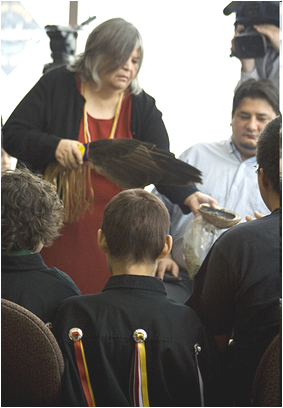 ane Meader was raised in Membertou First Nation, adjacent to the city of Sydney in Unama’ki (Cape Breton), Nova Scotia. Mi’kmaq is her first language, and she deeply holds and daily lives the traditional teachings and values that she has learned from Elders throughout the course of her life, beginning in early childhood. Today, she provides and participates in traditional ceremonies and gatherings at home and across North America. Jane has extensive, diverse experience in the professional educational arena and is a developer and implementer for Mi’kmaw cultural activities and events for many schools throughout Nova Scotia. Jane obtained a Certificate in Early Childhood Education in 1980 from the Frobel Centre for Early Childhood Education, a Certificate in Northern and Native Education in 1996 from McGill University, a Bachelor of Arts Community Studies (BACS) in 2002 from Cape Breton University, a Bachelor of Education (BEd) in 2004 from St. Francis Xavier University, and a Masters of Education (MEd) from St. Francis Xavier University. Today, Jane often teaches courses for St. Francis Xavier University and Cape Breton University, while also continuing to be a key educator in her home community of Membertou.
ane Meader was raised in Membertou First Nation, adjacent to the city of Sydney in Unama’ki (Cape Breton), Nova Scotia. Mi’kmaq is her first language, and she deeply holds and daily lives the traditional teachings and values that she has learned from Elders throughout the course of her life, beginning in early childhood. Today, she provides and participates in traditional ceremonies and gatherings at home and across North America. Jane has extensive, diverse experience in the professional educational arena and is a developer and implementer for Mi’kmaw cultural activities and events for many schools throughout Nova Scotia. Jane obtained a Certificate in Early Childhood Education in 1980 from the Frobel Centre for Early Childhood Education, a Certificate in Northern and Native Education in 1996 from McGill University, a Bachelor of Arts Community Studies (BACS) in 2002 from Cape Breton University, a Bachelor of Education (BEd) in 2004 from St. Francis Xavier University, and a Masters of Education (MEd) from St. Francis Xavier University. Today, Jane often teaches courses for St. Francis Xavier University and Cape Breton University, while also continuing to be a key educator in her home community of Membertou.
Lawrence Wells, Elder
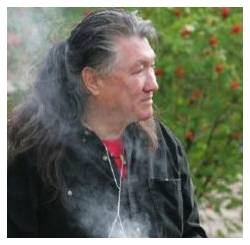 Lawrence Wells is a greatly loved Mi'kmaw Elder and Pipe Carrier who lives in Membertou First Nation in Unama'ki (Cape Breton), Nova Scotia. His Spirit Name is 'Keeper of the Children, Keeper of the Fire, and Keeper of Lodges'. Lawrence has studied, practiced and shared his knowledge for over twenty years and passes on the teachings of the Elders - teachings that as part of Aboriginal culture and tradition are sacred and guide our lives each day. He has 25 years experience in the field of addictions as a counselor in his community of Membertou and with the Native Alcohol & Drug Abuse Counseling Association in Eskasoni. Lawrence is very involved with the youth, Elders, community events, and residential school survivors and descendants. He is a stone/wood carver as well and carves many beautiful peace pipes for prayer. He has a vast awareness of nature, the elements and animals. He is more than willing to share his understandings of the ‘Seven Sacred Teachings' and the animals involved. He states: “Healing is endless. So we must take small steps to get there." Lawrence has helped the Integrative Science team in many ways over the years, including as a participant in various workshops and projects, as an enabler for our Sweat Lodge evenings, and as a provider of guidance for Andrew Sark when he was our youth outreach worker.
Lawrence Wells is a greatly loved Mi'kmaw Elder and Pipe Carrier who lives in Membertou First Nation in Unama'ki (Cape Breton), Nova Scotia. His Spirit Name is 'Keeper of the Children, Keeper of the Fire, and Keeper of Lodges'. Lawrence has studied, practiced and shared his knowledge for over twenty years and passes on the teachings of the Elders - teachings that as part of Aboriginal culture and tradition are sacred and guide our lives each day. He has 25 years experience in the field of addictions as a counselor in his community of Membertou and with the Native Alcohol & Drug Abuse Counseling Association in Eskasoni. Lawrence is very involved with the youth, Elders, community events, and residential school survivors and descendants. He is a stone/wood carver as well and carves many beautiful peace pipes for prayer. He has a vast awareness of nature, the elements and animals. He is more than willing to share his understandings of the ‘Seven Sacred Teachings' and the animals involved. He states: “Healing is endless. So we must take small steps to get there." Lawrence has helped the Integrative Science team in many ways over the years, including as a participant in various workshops and projects, as an enabler for our Sweat Lodge evenings, and as a provider of guidance for Andrew Sark when he was our youth outreach worker.
Andrew (Andy) Woodsworth, PhD
.jpg) Andy Woodsworth lives in Victoria, BC, and holds a PhD in physics from Queen’s University. He is a long time member of IAU (International Astronomical Union), the organization that encouraged UNESCO and the United Nations to declare 2009 as the International Year of Astronomy (IYA). It was Andy along with Dr. Jim Hesser, the other Canadian representative on the international steering committee for IYA, who suggested that all countries include Aboriginal astronomy within their IYA celebrations. Shortly thereafter, Andy and Jim invited Integrative Science at Cape Breton University to participate on the Canadian IYA steering committee; this was the catalyst for the work with Mi’kmaw Elders in Cape Breton that led to creation of an animated video for the Mi’kmaw Night Sky Story “Muin and the Seven Bird Hunters” and later to the children’s storybook of the same name. Andy attended the 2005 CASTS (Canadian Aboriginal Science and Technology Society) national conference held in Cape Breton, NS, co-hosted by Cape Breton University (CBU), the Unama’ki Institute of Natural Resources (UINR), and Membertou First Nation. Andy also presented at CASTS 2007 in Calgary, speaking about the vision held by CBU’s Integrative Science team and Mi’kmaw College Institute in conjunction with the IYA Canada steering committee to encourage Aboriginal participation in IYA in Canada. Andy was also a guest speaker at the annual Cape Breton University Storytelling Symposium in 2009 which focused on astronomy stories in recognition of IYA. Andy was a member of the Advisory Board for IYA in Canada and he chaired its Communications Committee, creating the IYA – Canada website (www.astronomy2009.ca). All the above (and much more) he has done while retired! Andy worked for 30 years with the National Research Council (NRC) of Canada, which he joined in 1975. During those years, he worked as a researcher in astronomy and also served as the project manager for the first Canadian national Internet (Ca*net), as the Canadian project manager for the Gemini Observatory in Hawaii and Chile, as the Director General of the NRC Institute for Information Technology (developing technology clusters in Atlantic Canada and Quebec), and as the interim Vice-President of NRC, Research (Life Science and Information Technology). Although Andy retired from NRC in 2005, he worked in 2007-2008 with the Natural Sciences and Engineering Research Council (NSERC) of Canada to review their Discovery Grants Program. Currently, Andy serves as Chair of the Board of Compute Canada and as Vice-President of Leadership Victoria. He also is a member of the annual review committee for the ALMA (Atacama Large Millimeter/submillimeter Array) international observatory project. ALMA is a partnership of Europe, North America and East Asia in cooperation with Chile and is the largest astronomical project in existence. Its single telescope is of revolutionary design and is composed of 66 high precision antennas located on the Chajnantor plateau at 5000 meters altitude in northern Chile. Andy owns the company “Galaxy Consulting” and continues to be an active participant in astronomy outreach to schools and communities in British Columbia.
Andy Woodsworth lives in Victoria, BC, and holds a PhD in physics from Queen’s University. He is a long time member of IAU (International Astronomical Union), the organization that encouraged UNESCO and the United Nations to declare 2009 as the International Year of Astronomy (IYA). It was Andy along with Dr. Jim Hesser, the other Canadian representative on the international steering committee for IYA, who suggested that all countries include Aboriginal astronomy within their IYA celebrations. Shortly thereafter, Andy and Jim invited Integrative Science at Cape Breton University to participate on the Canadian IYA steering committee; this was the catalyst for the work with Mi’kmaw Elders in Cape Breton that led to creation of an animated video for the Mi’kmaw Night Sky Story “Muin and the Seven Bird Hunters” and later to the children’s storybook of the same name. Andy attended the 2005 CASTS (Canadian Aboriginal Science and Technology Society) national conference held in Cape Breton, NS, co-hosted by Cape Breton University (CBU), the Unama’ki Institute of Natural Resources (UINR), and Membertou First Nation. Andy also presented at CASTS 2007 in Calgary, speaking about the vision held by CBU’s Integrative Science team and Mi’kmaw College Institute in conjunction with the IYA Canada steering committee to encourage Aboriginal participation in IYA in Canada. Andy was also a guest speaker at the annual Cape Breton University Storytelling Symposium in 2009 which focused on astronomy stories in recognition of IYA. Andy was a member of the Advisory Board for IYA in Canada and he chaired its Communications Committee, creating the IYA – Canada website (www.astronomy2009.ca). All the above (and much more) he has done while retired! Andy worked for 30 years with the National Research Council (NRC) of Canada, which he joined in 1975. During those years, he worked as a researcher in astronomy and also served as the project manager for the first Canadian national Internet (Ca*net), as the Canadian project manager for the Gemini Observatory in Hawaii and Chile, as the Director General of the NRC Institute for Information Technology (developing technology clusters in Atlantic Canada and Quebec), and as the interim Vice-President of NRC, Research (Life Science and Information Technology). Although Andy retired from NRC in 2005, he worked in 2007-2008 with the Natural Sciences and Engineering Research Council (NSERC) of Canada to review their Discovery Grants Program. Currently, Andy serves as Chair of the Board of Compute Canada and as Vice-President of Leadership Victoria. He also is a member of the annual review committee for the ALMA (Atacama Large Millimeter/submillimeter Array) international observatory project. ALMA is a partnership of Europe, North America and East Asia in cooperation with Chile and is the largest astronomical project in existence. Its single telescope is of revolutionary design and is composed of 66 high precision antennas located on the Chajnantor plateau at 5000 meters altitude in northern Chile. Andy owns the company “Galaxy Consulting” and continues to be an active participant in astronomy outreach to schools and communities in British Columbia.
Veronica (Flo) Young, Elder
